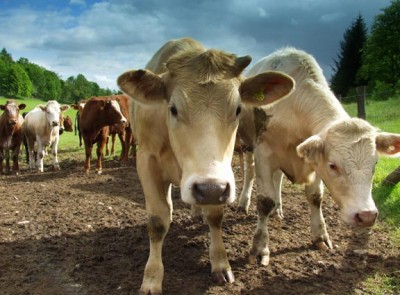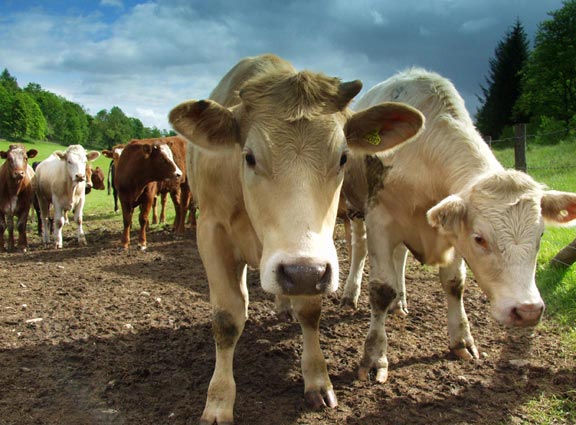
As a child who had made the decision—to my parents’ chagrin, at least in part because for the better part of my childhood I ate little other than various combinations of dough, tomato sauce, and cheese — to become a vegetarian, Shavuot was one of my highlights of the Jewish calendar. It was the one Jewish holiday where I, one of the pickiest eaters I had known growing up, would be able to eat my favorite foods as part of the celebration of the holiday. Normally, the picky eater in me ate only challah (the inside, never the crust, of course) on Shabbat and holidays. On Shavuot, however, I was able to eat all of my favorite foods.
I began eating meat in fifth grade. Over time, my relationship to food —and to meat in particular— has changed. I started out eating chicken, then beef. First, I would only eat meat on Shabbat and holidays when other food options (I refused, at that point, to even consider eating anything containing vegetables) were unavailable. Then I began eating meat at restaurants when I was out with my friends or family. When I got to college, I began cooking for myself, and decided to only prepare vegetarian foods in my kitchen. I now eat meat only if I go out with friends to a restaurant or if it’s being served in the cafeteria or at a meal I’m attending, but I never prepare it for myself.
Shavuot, as a child, was the time when my favorite foods — baked ziti, blintzes, mac ‘n’ cheese — were readily available. Even though I eat meat now, my family and I still make the conscious decision to eat dairy on Shavuot, which has actually made the holiday even more special. It is especially important to me, as a meat-eater who consumes meat primarily on Shabbat, holidays, and Wednesdays (Meat Day at the JTS cafeteria), to have Shavuot as the one holiday where the tradition of eating meat changes.
As we discover the increasing number of ways in which meat consumption is environmentally unsustainable and learn more about how our meat goes from farm to table in ways that harm both animals and people, Shavuot reminds me of the need to be conscientious of the amount of waste I produce and the environmental footprint my decisions leave behind.
That’s not to say, however, that I believe I can be excused for eating a hamburger by also composting the leftovers from the salad I made earlier that day, the environmental equivalent of having a Diet Coke to offset your Big Mac. Shavuot, for me, serves as a reminder that, contrary to the Rabbinic dictum, there can exist happiness and joy without wine and meat. We Jews tend to define our holidays by the foods we eat (or don’t eat). Indeed, in counting the Omer from Passover to Shavuot, we mark the transition from a time of constraint when we intentionally overly restrict the types of food we consume to a time of receiving a Torah which lays out, in painstaking detail, the types of animals we are allowed to eat. Why not celebrate receiving the Torah and its rules by eating whatever we choose? Indeed, the reason cited for abstaining from consuming meat on Shavuot seems oddly counter-intuitive when we consider that we are celebrating receiving the Torah. If Shavuot is a holiday when we celebrate receiving the Torah, then we should intentionally eat meat, which the Torah commands we slaughter in a very particular way, not dairy, as a celebration of the commandments we were given.
Yet, the custom remains to eat dairy on Shavuot. In so doing, we intentionally restrict ourselves once again, albeit at a more customary and much less prohibitive level, from eating certain kinds of foods. While we restrict ourselves on Passover to remember the Exodus from Egypt, we do it again on Shavuot to remember not to celebrate the Torah, but rather, to remember a time when we did not have these restrictions. Thus, even when we mark the point in our cultural memory when we received the very document that informs the types of meat we can and cannot eat, we continue restricting ourselves. While food restrictions on Passover force us to think critically about the ways we experience liberation and oppression by asking us to restrict ourselves during our celebration of freedom from slavery, the customs to refrain from eating meat on Shavuot forces us to question the ways in which our choices—especially when it comes to food—affect the world around us now that, seven weeks later, we are free and able to receive these new guidelines.
In this sense, Shavuot can become an even more powerful time to reflect on the ways we choose to leave our mark when it comes to the foods we consume in the name of our religion and our culture. It can serve as a time for reflection on the environmental footprint we choose to leave behind in the name of celebrating our Judaism and living our lives in general. We can, and should, enjoy our lives and the resources available to us; to me, however, Shavuot most serves as a reminder that those resources, like everything else, should be taken in moderation and not without thought for how the world is changed—for the better or for the worse—because of our actions.
Amram Altzman is a student at List College.

